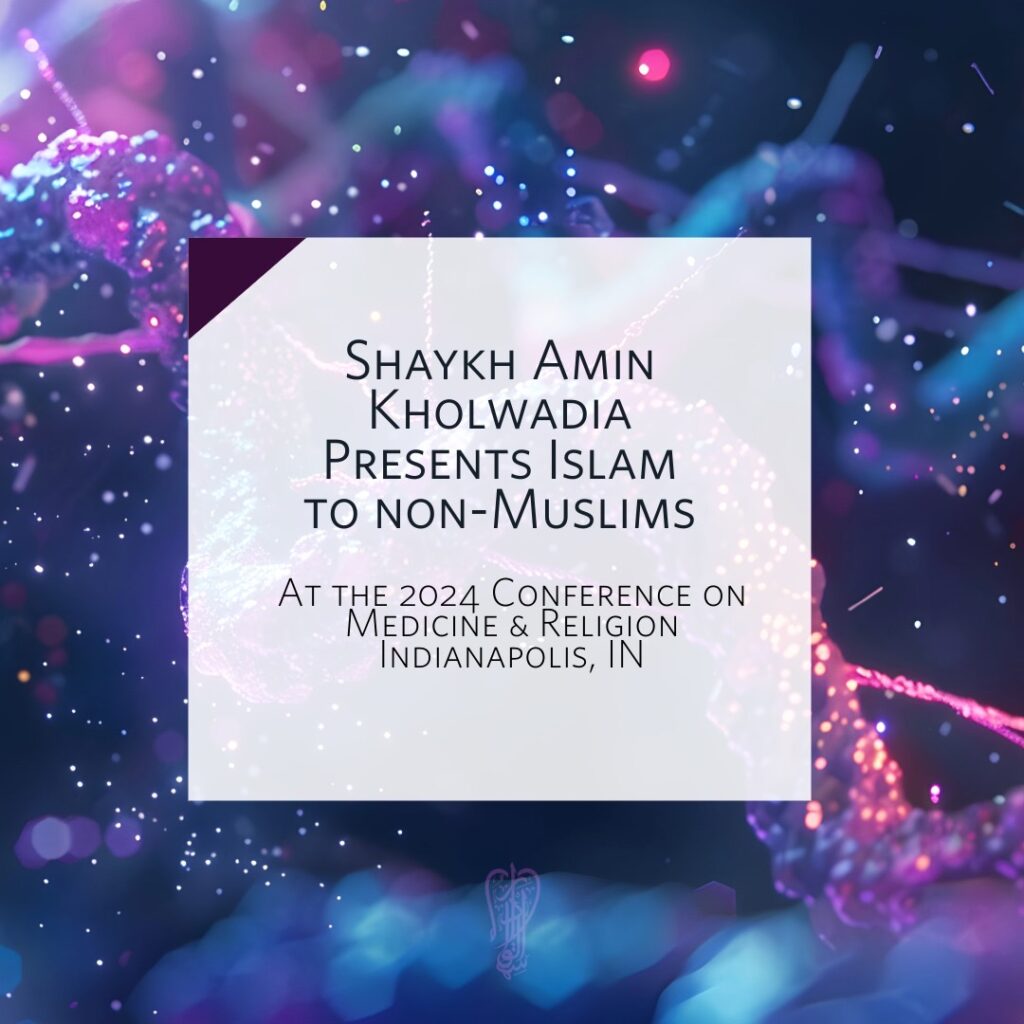
The Conference on Medicine and Religion, one of the premier academic conferences exploring the intersections of medicine and religion, took place in Indianapolis, Indiana approximately one week ago (April 14th-16 th , 2024).
Under the tutelage and mentorship of Shaykh Mohammed Amin Kholwadia, members of the bioethics cohort of the Al-Amin Ethics Institute (A Darul Qasim Initiative) collaborated to deliver three abstracts and one panel presentation. With Shaykh Amin’s guidance, these medical students and residents in collaboration with senior clinicians and researchers presented the following:
Below are links to the abstracts from the Al-Amin Ethics Institute/Darul Qasim College presentations:
The pinnacle of the conference was Shaykh Amin taking the uninitiated on a journey of self- reflection by describing who we are and from where did we come. As the ʿĀlim par excellence, Shaykh Amin began his lecture by defining the nafs, as the self, the ego, the being, and/or entity that makes you – you or makes me – me. The Shaykh qualified the nafs as a great container that accommodates the heart (qalb), but only if the nafs purifies itself and reaches the highest levels of intellect by submitting the rational mind to the moral authority of the Prophet Muhammad ﷺ and acquiescing to Allah’s will. The self or nafs can actualize its potential by recognizing the rūḥ or spirit and its true nature in the cosmos, as the Shaykh mentioned the Prophetic Hadith, “that people are (potential) mines, gold mines and silver mines…”
Shaykh Amin lauded the critical role of the Ṣūfī tradition in preserving Islamic civilizational values by focusing on drawing close to Allah via inner reflection and contemplation, purifying ones moral character and enhancing human development. A fully self-realized Ṣūfī, according to Shaykh Amin, is “someone who is happy with God at all times” independent of their actual circumstances. “The Ṣūfī’s goal is to draw nearer to the Creator and in drawing closer to his Maker, he becomes closer to people also!”
The supporting presenters, senior clinicians and researchers, effectively argued that the status quo in medicine and healthcare is lacking professionalism and is primarily driven by greed, fraud, and corruption and that this lack of ethical behavior precludes the positive outcomes that should manifest as healing and cure for human universally. Each presenter boldly posited the fact that for any true societal or professional change to come, each individual practitioner needs to be willing to take critical and humbling advice from a life coach, known as a Ṣūfī Shaykh, that not only reforms them but challenges them to do better via the Ṣūfī practice of tazkiyat-un-nafs (taming or purifying the self). The medical practitioners creatively shared personal experiences and practical challenges – they were able to face and address successfully, primarily due to having the privilege and pleasure of engaging with a Ṣūfī Shaykh.
Shaykh Amin’s dry wit and charm were on full display when he cleverly reminded the audience of Muslim ethics and integrity that formed the foundation of a global economy that spanned a millennium: "Who the heck is Adam Smith anyways? The ‘father of economics’ really, give me a break! He’s Scottish for God’s sake!”
The audience was mesmerized and engaged throughout Shaykh’s powerful talk as evidenced by nods of acknowledgement and detailed follow-up questions that confirmed how attentive and receptive the non-Muslims in the audience had been to receiving the Shaykh’s insights.
Overall, the 2-day conference provided an ideal academic stage for four presentations from the bioethics cohort of the Al-Amin Ethics Institute punctuated by a masterful lecture by Shaykh Amin demonstrating how to give da’wah to non-Muslim audiences in an academic setting. Based on the comments and feedback of the audiences, they were longing for more, and perhaps they were inspired to begin their own quest for more knowledge, Inshā’Allāh!